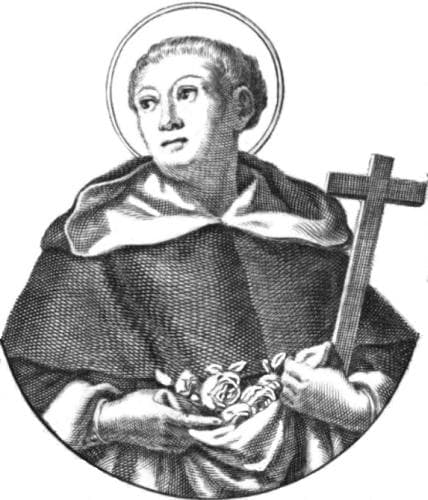
Blessed Alvarez Of Cordova
Blessed
Feast Day: February 19
Biography
Blessed Alvarez of Cordova, also known as Alvarez de Zamora or Albaro, was a renowned preacher, pilgrimage leader, and influential figure in the Catholic Church. Born in either Lisbon, Portugal or Cordova, Spain (sources vary), he joined the Dominican Order in Cordova in 1368.
Alvarez gained a reputation as a skilled and well-traveled preacher, becoming widely known in Andalusia and Italy. His preaching talent and passion led him to embark on a pilgrimage to the Holy Lands, where he experienced a deep spiritual connection. Inspired by his pilgrimage, he began preaching for a Crusade in order to defend and restore access to these holy places.
Apart from his role as a preacher, Alvarez also served as a personal confessor, spiritual guide, and political advisor to Queen Catherine. He also played a significant role in the education of young King John II. Alvarez opposed the Avignon pope, Peter de Luna, and actively worked towards reforming practices that had become common at court.
One of Alvarez's lasting legacies is the establishment of Escalaceli, a Dominican house of strict observance located in the mountains around Cordova. This place became renowned for its piety and scholarship. Alvarez spent his days in Escalaceli preaching, teaching, and begging for alms in the street, while his nights were devoted to prayer.
Within the gardens of Escalaceli, Alvarez created a series of oratories decorated with images of the Holy Lands and the Passion, similar to the modern Stations of the Cross. These oratories served as places of meditation and reflection for the faithful who visited the house.
Indeed, miraculous occurrences are associated with Blessed Alvarez. According to reports, angels assisted in the construction of Escalaceli, moving construction materials during the night for the workers to find conveniently during the day. Additionally, there are accounts of divine providence providing sustenance for the house, such as the event when the entire food stocks were reduced to a single head of lettuce. After giving thanks for the meal, Alvarez sent the porter to the door, only to find a stranger who led a mule loaded with food. Once the food was unloaded, both the stranger and the animal disappeared.
Another notable event involved Alvarez encountering a dying beggar alone in the street. He wrapped the poor man in his own cloak and carried him back to Escalaceli. However, upon arriving and unwrapping the cloak, Alvarez discovered a crucifix in place of the man. This crucifix continues to hang in Escalaceli today, serving as a testament to this remarkable occurrence.
Furthermore, it is said that a bell in the chapel, which contains Alvarez's relics, rings by itself just before the death of someone within the house. These miraculous incidents further solidified the devotion and veneration surrounding Alvarez even after his death.
When attempts were made to move Alvarez's relics to Cordova, violent storms thwarted the travelers, causing them to abandon their mission. As a result, his remains were left in Escalaceli, where they are buried. Alvarez's beatification took place on September 22, 1741, under the papacy of Benedict XIV.
Blessed Alvarez of Cordova's life and legacy continue to inspire individuals with his deep spirituality, devotion to preaching, and piety. His commitment to reforming practices and his establishment of Escalaceli served as beacons of holiness and scholarship in the Catholic Church. Through his remarkable experiences and his dedication to the faith, Alvarez remains a revered figure among those who admire his unwavering commitment to God and his fellow human beings.